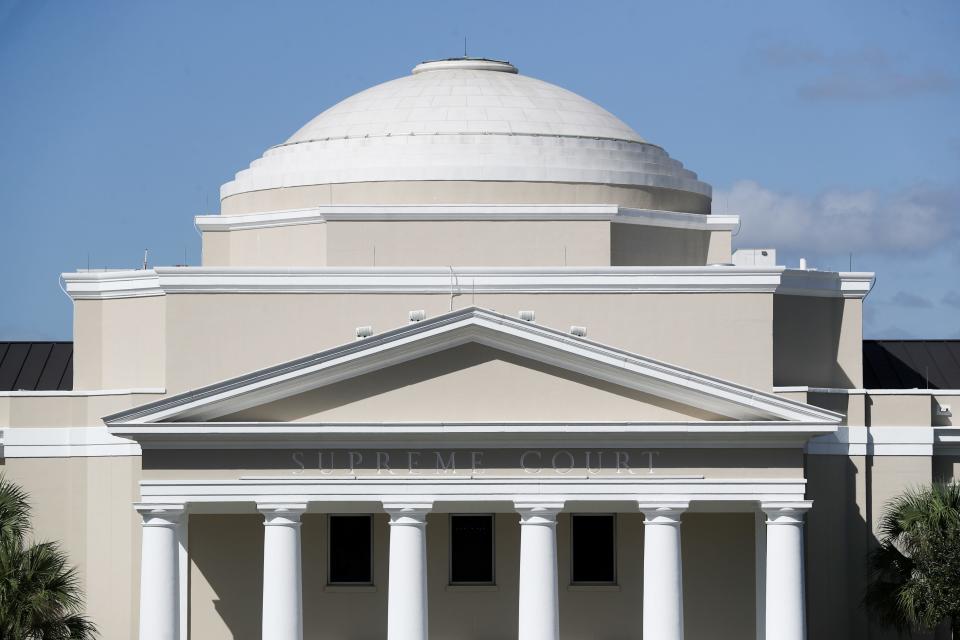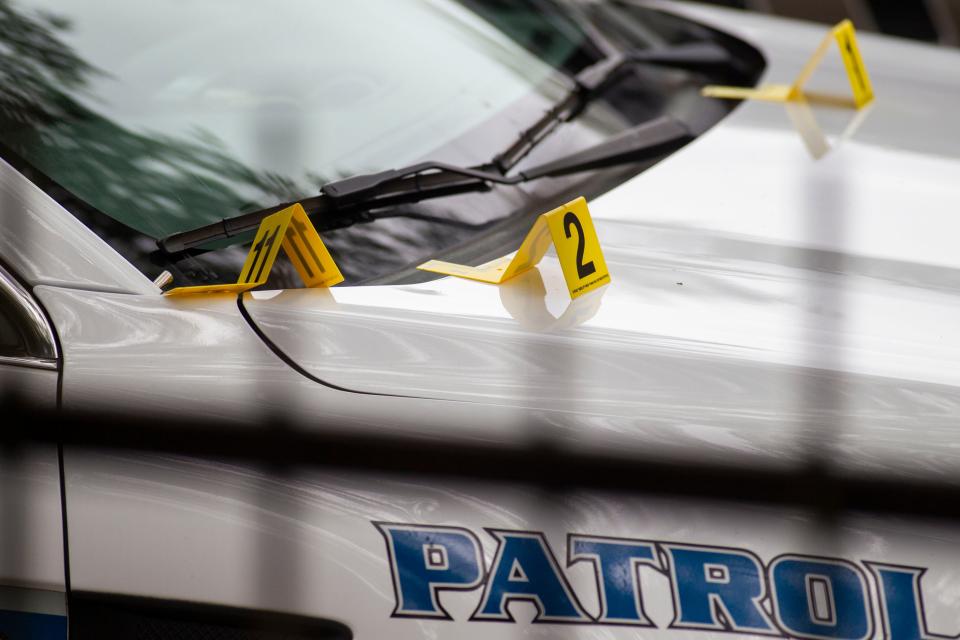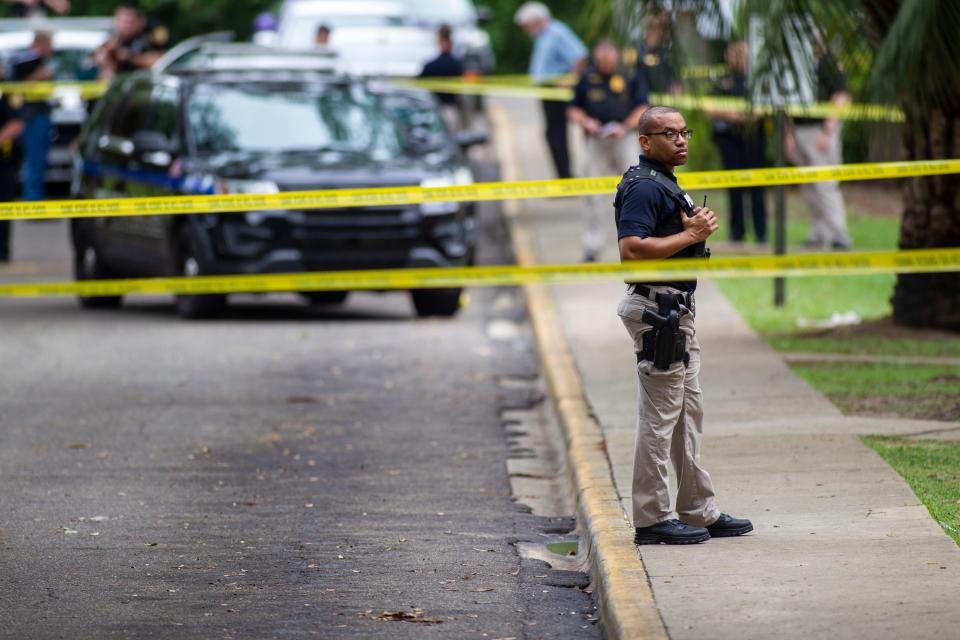'Secret police' or a right to anonymity? Florida Supreme Court to decide future of Marsy's Law
In a case with major implications for police accountability across the Sunshine State, the Florida Supreme Court will decide whether police officers have the right to remain anonymous under Marsy’s Law when they use deadly force in the line of duty.
Justices will hear oral arguments Wednesday in a legal dispute sparked by a pair of fatal shootings of armed suspects in 2020 by Tallahassee police officers. The case pits the city of Tallahassee, which wants to release the officers’ names, against its own Police Department, which wants to keep the names confidential.
Killed in the shootings were Wilbon Woodard, who attacked a man and charged at officers with a hunting knife May 19, 2020, outside a North Monroe Street restaurant, and Tony McDade, a Black transgender man who stabbed a neighbor’s son to death before raising a gun at an officer. McDade’s death, which happened only two days after George Floyd was killed by police in Minneapolis, made headlines amid national Black Lives Matter protests.
A USA TODAY investigative reportMarsy’s Law was meant to protect crime victims. It now hides the identities of cops who use force.
After a Leon County grand juror cleared officers in the two shootings, the city was poised to identify them in response to public records requests from the Tallahassee Democrat and other news outlets. However, the Florida Police Benevolent Association, which represents the two officers, filed an injunction to block release of their names.
The PBA argued that the officers were protected under Marsy’s Law, a constitutional amendment passed by Florida voters in 2018 that grants privacy and other rights to victims of crime. Under the PBA’s view, the officers, known only as John Doe 1 and 2, were victims of aggravated assaults perpetrated by the suspects they killed.

The Tony McDade case
'Somebody failed somewhere': Family of slain Malik Jackson warned Tony McDade was dangerous
City commissioners pull police shooting videos from website after outcry from family
Judge rules Marsy's Law does not apply to police officers on duty in Tony McDade case
1st DCA rules Marsy's Law privacy applies to police, shielding officer in Tony McDade case
The city and news organizations scored an early victory in the case, when Leon Circuit Judge Charles Dodson ruled that Marsy’s Law doesn’t apply to police officers while they’re on the job. However, he was reversed by the 1st District Court of Appeal, setting the stage for the Supreme Court to rule.
The city’s legal counsel, including City Attorney Cassandra Jackson and Tampa lawyers Philip Padavano and Joseph Eagleton, wrote in briefs that Florida voters “never could have imagined this case” when they signed off on Marsy’s Law. The constitutional amendment was intended to put victims on an equal footing with defendants and make sure their voices were heard in court — not to create “a secret police force,” they said.
“Police officers are dedicated public servants and honorable representatives of the government,” city lawyers wrote. “Led by their union, though, a few officers are invoking Marsy’s Law to prevent the public from learning about their on-duty actions. As now authorized by the First District, they are transforming Marsy’s Law into a cloak of anonymity for police conduct to the detriment of the public these officers serve.”

Luke Newman, a Tallahassee attorney representing the PBA, had an entirely different take, arguing that the plain language in the constitution defines a victim as “a person” who suffers harm as the result of a crime, attempted or otherwise.
“This ongoing legal argument should, literally, end there,” Newman wrote in the PBA’s brief. “The John Doe respondents are persons. Violent crimes were committed against both of them. Resultingly, absent any other language, the protections afforded in the law apply to the two respondents.”
Marsy's Law impact:
City of Tallahassee denies it changed stance on Marsy's Law in Tony McDade case
Marsy's Law prompts TPD to clamp down on crime victim information
Sheriff, police oversight panel join challenge against Marsy’s Law ruling shielding officers
PBA lawyer likens case to Stand Your Ground ruling; city attorney says 'clarity' sought
In his legal brief, Newman wrote that the Supreme Court in 2018 found that Stand Your Ground statutes applied to “a person” and therefore “plainly and unambiguously” applied to police officers. In an interview, he said his clients are relying on the law as written and expecting the courts to enforce the law as written.
“A victim is a person,” he said. “My client is a person. Make the jump for me. How is my client not a victim?”
Newman and other PBA lawyers cited protests against police in 2020 as a reason for confidentiality, saying that his clients could have faced harassment or worse if their names were disclosed. He said not disclosing their names would not affect transparency at the city and noted that videos of the incident were released by the city and available for the public to analyze.

Point: Read the PBA's argument here
Counterpoint: Read the city's argument here
The city has maintained all along that Marsy’s Law doesn’t apply to police officers while on duty, said City Attorney Cassandra Jackson. She said in email that the law doesn’t specifically reference coverage for police and therefore, “any doubt as to the applicability of an exemption must be construed in favor of public disclosure.”
She refuted that the city and its police department are on opposite sides of the constitutional argument.
“The Police Department is directed and supervised by the city manager; thus, they are not on opposite sides but rather act in concert,” Jackson said. “The city is litigating this case because the city, as has been stated throughout this litigation, believes it would benefit from the judiciary’s guidance on this recurring issue of public concern.”
More: Two Tallahassee commissioners call for use-of-force policy change, others await citizen panels
Making public the names of officers involved in shootings is in line with a top city priority of transparency and bolstering public trust, she continued. The Supreme Court ruling, she says, will clear up what has become a murky area of public discourse.
The last time the city had oral arguments before the high court was in June when it and other municipalities argued against a state law barring local governments from being able to pass gun regulations. No ruling has been made yet in that case.

From the opinion page
TPD's flawed interpretation of Marsy's Law keeps public in the dark | Our opinion
Bill Cotterell | Appeals court wounded public’s right to know with Marsy's Law decision
The Tallahassee Police Department, like many law-enforcement agencies, has taken broad liberties in its interpretation of Marsy’s Law. After the law went into effect in early 2019, the department clamped down on the release of basic information involving crimes, including the names of victims, who can request anonymity under the law.
Media outlets urge court not to 'warp' Marsy's Law in police force cases
Even before Marsy’s Law passed, open-government advocates worried about potential overreach. The TPD case only heightened those concerns along with fears that the public’s trust in law enforcement could be eroded.
Want public records?: ‘So sue me’ seems to be state’s attitude, First Amendment experts say
Barbara Petersen, executive director of the Florida Center for Government Accountability, said she was baffled by the argument in support of keeping officer names confidential. She said officers, by the nature of their job and training, “interject” themselves into situations.
“They’re not the same as me when they’re on duty,” Petersen said. “We’re not saying they’re not people. We’re saying they’re people who while on duty have a tremendous amount of power. We acquiesce and give them power, and we want to make sure they don’t abuse that power while they’re on duty.”
Petersen referenced a Sarasota incident in which the Sheriff’s Office and prosecutors filed a “prior restraint” injunction to bar the Sarasota Herald-Tribune from publishing the names of two deputies involved in a fatal shooting of a man who approached them with a knife. The injunction was dismissed in June.
From the Sarasota newsroom: Herald-Tribune challenges order against identifying deputies in fatal shooting
A coalition of media outlets and organizations joined with the city of Tallahassee in the high court litigation. The coalition consists of the First Amendment Foundation, the Florida Press Association, the Gannett Company, including the Tallahassee Democrat, The McClatchy Company, including the Miami Herald, and the New York Times Company.
Newspapers join the fight: City of Tallahassee, newspapers will seek Florida Supreme Court review of Marsy's Law ruling
Lawyers for the news groups wrote in a brief that Marsy’s Law must be “harmonized” with the constitutional right of access to public records. They said the law was never intended to “anonymize government killings.”
“(Marsy’s Law) should not be warped into a vehicle to shield government actors, imbued with the authority to wield lethal force, from public scrutiny,” media lawyers wrote, “particularly when the ‘victimizer’ is killed by the ‘victim.’ ”
Contact Karl Etters at ketters@tallahassee.com or @KarlEtters on Twitter.
Never miss a story: Subscribe to the Tallahassee Democrat using the link at the top of the page.
This article originally appeared on Tallahassee Democrat: Marsy's Law in Florida: Case pits Tallahassee vs. TPD in Supreme Court

